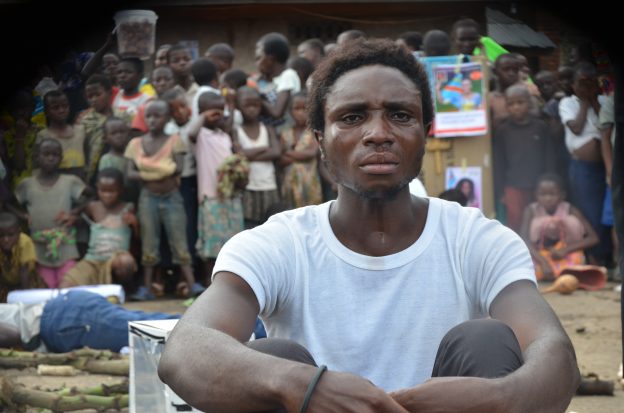Theatre of the Oppressed practitioner Eliezer Kasereka explains just how crucial Augusto Boal’s trailblazing techniques are for bringing people in East Africa together in a theatrical process of peace and reconciliation
‘Although I was scared, hungry and thirsty I did not cry during the more than 40 days that they were with me in the bush. They were not allowed to see my tears… Satisfying the sexual desire of these men, most of whom were the same age as my children – even today I couldn’t cry until you had performed this theatre. It affected me a lot…’ So says Kahindo, an older female victim of kidnapping and rape in the militia camps. This said during our Theatre of the Oppressed performance at Rubare Healing Centre in Rutshuru, in the east of the Democratic Republic of the Congo.
It is hard to imagine these things happening in such a beautiful region where the flora and fauna attract scores of tourists; a region where so many national and international organisations have invested millions for the cause of climate change, peace and tranquility – but a region in which people still live with trauma, insecurity, social inequality, human rights violation, and conflict. The cry of pain remains the reality in this Great Lakes Region of East Africa.
An everyday life of running and hiding, migration, social hardship, war, and kidnapping – and the conflicting ways in which our different countries deal with all of this – are the factors that continue to create trauma. Africa independence was a masquerade, and most of the scourges that devastate this region are consequences of government irresponsibility, and the lack of some politicians’ awareness. They promulgate laws and change them, but they don’t ensure that the entire population has understood them: the first victims of this situation are not enlightened.
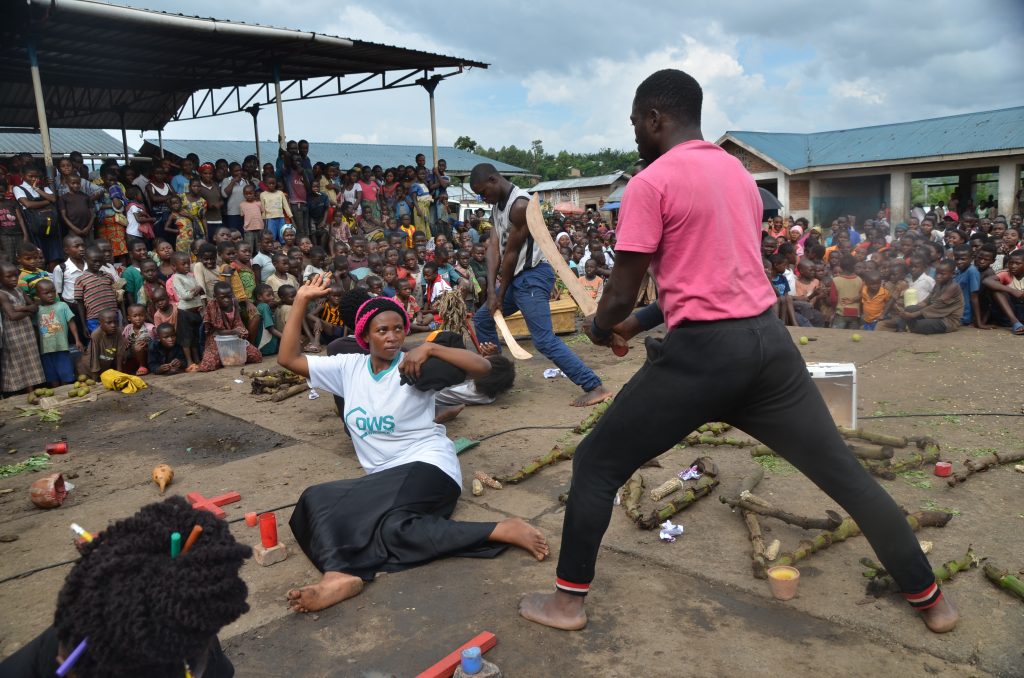
This is the environment in which our Theatre of the Oppressed group is working. Developed by Brazilian theatre practitioner Augusto Boal in the 1970s, initially in Brazil and later in Europe then worldwide, Boal’s techniques use theatre as a means of promoting social and political change. In Theatre of the Oppressed shows, the audience becomes active, and as ‘spect-actors’ they explore, show, analyse and transform the reality in which they are living.
I first encountered Theatre of the Oppressed in 2014. As a young adult and youth leader in my Nande community – and having grown up in this region of land disputes, war and so many other complex conflicts – I had developed a strong image of Rwanda and all people who speak Kinyarwanda as ‘the enemy’ because so many friends and people close to me were killed by the Rwandan rebel groups CNDP and M23. For me, as for other youths from my tribe, the only good Rwandan was a dead one. I lived my life with prejudices against, and stereotyped perceptions of, the Hutu – a Congolese ethnic group with whom we have lived side-by-side in the same Rutshuru territory for generations – because they speak Kinyarwanda: for us, they are Rwandan not Congolese. Hatred and anger were directed against the Tutsi. We had suffered from the violent attacks of the Kinyarwanda-speaking soldiers and rebels. In this region, even some churches belong exclusively to one ethnic group: there is no union among church leaders; many of them act with hypocrisy rather than responsibly.
At that time, a few months after the M23 rebel movement war in 2014, Claus Schrowange, a German Theatre of the Oppressed trainer and facilitator, performed in Kiwanja with a Theatre of the Oppressed team that mixed Rwandan, Burundians and Congolese. My friend and I were against them just because of the Rwandans amongst them, and we decided to give people a wake-up call, and to punish them by throwing stones. We felt that it was not acceptable to see Rwandan Tutsi again in our land, trying to enhance dialogue and peace through theatre that aimed to unite people from DR Congo and Rwanda. We managed to stop the show, and they left without finishing their performance as they were afraid. Kicking out Claus and his theatre team from our city was a victory, and the news of our success spread across the city.
Some weeks later, Claus returned to our city with the same team, and performed twice. We tried to stop them again, using violence, but Claus and his actors approached us and began to talk to us. From then, my life changed as I directly experienced the power that Theatre of the Oppressed has to change minds and heal hearts. Claus trained me in the Theatre of the Oppressed methods and techniques of Augusto Boal; and I consequently joined the Theatre of the Oppressed team. With them, I was opened up to the same situations we all faced: the prejudices, stereotypes and manipulations encountered are the same for us as for the Rwandans and Burundians. In this region, people carry a lot of open wounds and a heavy burden of past violence.

So, having grown up in this region and having faced the reality during two years of working with Claus and his Theatre of the Oppressed team in the Great Lakes region, I developed a strong interest in building peace. Today, I am well known in my territory both through my work with Theatre of the Oppressed and as a peace film writer; also as a person committed to working for peace and reconciliation.
In 2016 I created a theatre team called Amani Kwetu (Peace at Home) Theater of the Oppressed, trying to reconcile Hutu and Nande and different religions; working for legality, equality and peace. We are volunteering with many programmes to create constructive peace with former militia members of different armed groups, advocating peace and tolerance, working against prejudices around Ebola and Coronavirus in North Kivu, and working for climate change awareness. In 2022, we are trying to initiate a Theatre of the Oppressed project between loyal soldiers and former militia with civilians in order to build trust between them and see how this peace-making methodology can be reconciled with different climatic actions and environmental protection.
Personal stories of change and healing are at the core of our work. One of our troupe, an actor called Emery, decided to join our team in 2018 after our performances in a small marketplace in Rutshuru. He was a militia member and was there for food. He had spent more than seven years in the bush with the Resistant Patriots MAI MAI group. During the performance, he says: ‘Our commanders talk to us about nationality just to prove that our enemies are not true Congolese – just because this ethnic group was not in the Democratic Republic of Congo before 1908. Sometimes they quote the Bible to prove that we are right… Horrible things are done in the name of laws that are supposed to protect our country from “foreigners”.’
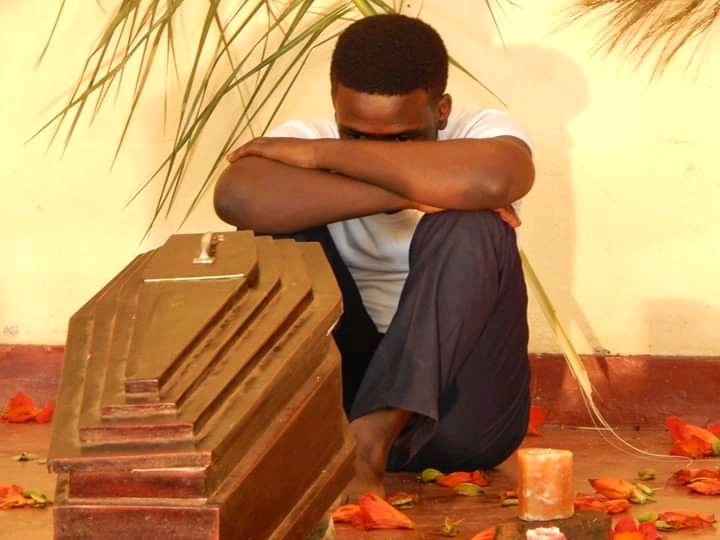
Nationality issues continue to be one of the problems ruining our region.Since 1960, the Congolese laws on nationality have been updated several times, and this was among the pretexts for the 1997 war. For example, when people from the Kinyarwanda speaking Banyamulenge group of Rwanda-Burundi settled in the Democratic Republic of Congo in 1950, they became legally and politically Congolese. But some years after, a different edict remodelled this law and the Banyamulenge ethnic group were excluded, leading to revolts. In 1971 the president’s MOBUTU government recognised their nationality and reinstated them. A few years later (in 1981) they cancelled this nationality, and in 1995 the VANGU report affirmed that ‘immigration and political exile are not cases of naturalisation, and parliament thus demands the unconditional repatriation of all immigrant refugees from Rwanda and Burundi’. Several nationalities of these excluded communities have lost their positions in the government and their diplomatic posts. There is trauma amongst the people and persecution in refugees camps abroad. Many people have been made stateless by these actions. An old woman from the Congolese refugee camps in Kigeme Rwanda testified to us during our performance that she had ‘learnt to cry and to shut up. The trauma of this loss of our land has never gone away; it’s hard and it still persists’.
Officially, our communities lived in peace, despite shifting borders and rules: there was seemingly trade, and even inter-community marriage was possible. But the reality is far from this. How can we educate and guide people who have been force-fed ancestral customary laws? How can we make it possible for a so-called ‘foreigner’ to acquire nationality and live like any other citizen of our country? To allow them to enjoy legal and political rights? How can we imagine that the deployment of the Blue Helmets (the name given to the United Nations peacekeepers) in this region of conflict is enough to convince these vulnerable people that this war – which to-date has killed 27 million Congolese as a consequences of government decisions on nationality status – is not a problem for all people speaking Kinyarwanda? More than 1 million people died (the majority Tutsi) during the genocide in Rwanda in 1994, but who cares if this gruesome statistic remains dominant in survivors’ memories of the genocide in DR Congo? This situation affected our young Rwandan actress, Therese. Her parents were killed during the genocide – her mother raped and killed in front of her – and until now, 20 years on, the fear and terror affects Therese. If it was not for the Theatre of the Oppressed methods, her early trauma would erupt again.
What does the border population of Rwanda-Burundi, who live from cross-border trade, gain in conflicts between Rwanda and Burundians, other then seeing their economies ruined? The same situation is there on the Uganda and Rwanda borders. Governments close borders and national identities shift. People’s minds are affected until they prefer to act badly against others. In Rutshuru, an audience member gave ripe mangoes to our Rwandan actors and while they were eating them, that man said, ‘the harvest was good this year because we have sown the seeds on the corpses of the Tutsi Rwandan rebellions of M23 – your brothers who died during the war’. In Karongi Rwanda, after our show, a soldier said to our actor, ‘even if you continue to perform this theatre for peace, we will continue to fight and beat the Congolese until Jesus comes back’.
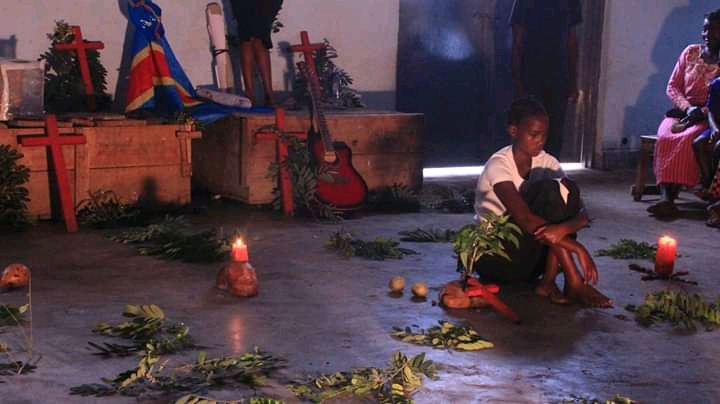
So this is our current situation, in summary: some tribes have been excluded from the country, there is immense trauma, and there is persecution in the different refugee camps. Many people have been made stateless and this has been one of the pretexts for the very many different wars in this region. People have died defending their nations against the wrong enemy – against innocent people. Hatred, anger and manipulation arm conflicts and affect the people of this region negatively.
Fortunately Augusto Boal’s methods exist to enlighten and reconcile people to each other. The Theatre of the Oppressed methods can even heal trauma – they can change the mind of the ‘spect-actors’, speaking truth in order to build peace, love and tolerance. I believe that the Theatre of the Oppressed methodology is saving many lives in East Africa.
Having understood that Africa needs us for its development – needs our skills, our studies and our talent – we continue to act and perform for change, and for the truth. Despite victimisation and intimidation and many other problems, we continue the work: to influence, to propose a change in people’s minds. We will perform even for just an audience of one – for one person can kill so many people, and perhaps his mind can be changed.
We are here in this Great Lake region to perform, to reach hearts and minds, and perhaps to save lives.
Our Theatre of the Oppressed methods, whilst being something now taught at universities around the world, are for us something we teach to a population who has never even been to school.
We give them hope and strength in the dark situations they have faced and are often still facing. We teach them love and tolerance because these qualities are the foundation of our African nations.
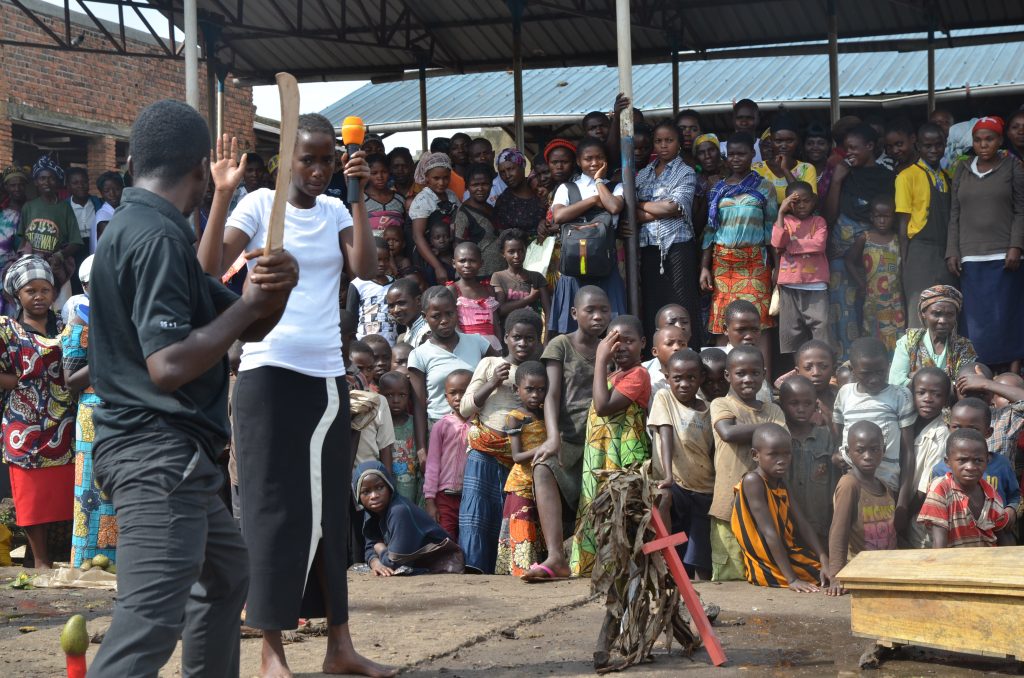
Featured image (top of page) and above image: Amani Kwetu Theater of the Oppressed: acting against discrimination and tribalism during the electoral campaign in a market, central Rutshuru.
All images by Apred-rgl
Eliezer Kasereka is from the Democratic Republic of Congo. He is a Theatre of the Oppressed practitioner and community leader. Following training in Augusto Boal’s methods, he worked for two years in the Great Lakes region of East Africa (Rwanda, Burundi and DR Congo), learning how participatory theatre could contribute to peace in war-torn regions. In 2016 he co-founded The Rutshuru Amani Kwetu Theatre of the Oppressed group for peace, reconciliation, legality, and equality.
Eliezer Kasereka took part in the Total Theatre Artists as Writers 2021-2022 programme.
E-mail: amanikwetuinternational2016@gmail.com
Social media contact details:
Linkedin: Amani Kwetu International
Twitter: @amanikwetuinte1
Facebook: Amani Kwetu Theater of the Oppressed

